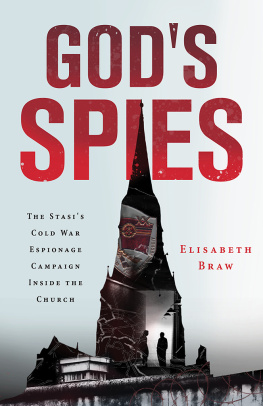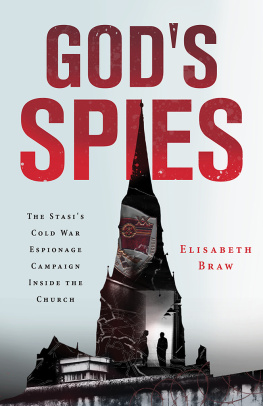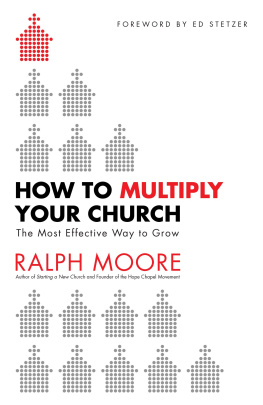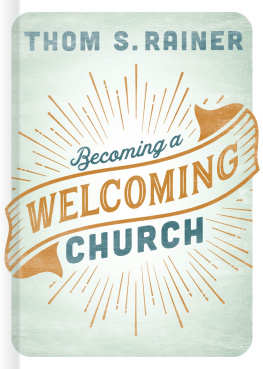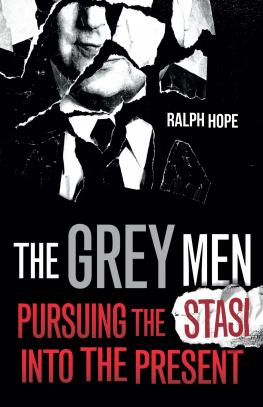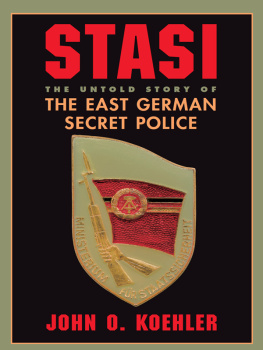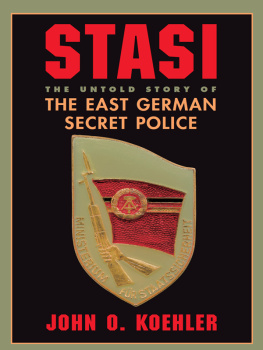In Gods Spies, Elisabeth Braw delivers a page-turning inside account of the East German intelligence services efforts to infiltrate and undermine the Lutheran Church. Featuring unique interviews with former Stasi spies involved in actions against the clergy and other members of the Church, Gods Spies is a must-read for anyone seeking a better understanding of the anatomy and the ultimate end of East Germanys repressive regime. If you love real-life spy stories, Elisabeths book is for you.
FRED KEMPE,
President of the Atlantic Council
Elisabeth Braw brings to her work the engaging style of an outstanding journalist, the keen eye of a seasoned analyst, and both the critical distance and empathy of an observer/participant. A rare combination indeed! Gods Spies is about history, communism, and the never-ending struggle for freedom, integrity, and democracyan important read for more reasons than one.
JEFFREY GEDMIN, Editor-in-Chief,
The American Interest
In an account based on unique material from not only the victims but alsoa rare feat of reportingfrom the perpetrators, Braw writes with insight and sympathy about the sinister work of East Germanys Stasi secret police in its decades-long attempt to manipulate and exploit peoples most sacred and private personal beliefs. She explains how the persecutors succeeded in penetrating the protestant church to a far greater extent than was realized at the time or even after the fall of the Berlin Wall. But the Stasi ultimately failed to dent the conscience and courage of the believers. Churches, pastors, and congregations were the catalysts in the popular uprising that brought down the grim rule of the Communist regime. Readers will be captivated by the humanity of the characters depicted and the flaws and virtues they exhibit in the face of dilemmas, oppression, and temptation.
EDWARD LUCAS, The Times
Elisabeth Braw succeeds in giving us what only a few have done successfully in Germany so far: a look at a locked world of the spies of God and their puppet masters from the Ministry of State Security. She chooses small but precise snapshots and interviews the participants without drawing attention to her investigative work. Readers have received a refreshing narrative from her experienced pen.
HELMUT MLLER-ENBERGS, scientist of the
Federal Commissioner for the STASI files
and the Syddansk University in Denmark
Through personal conversations with former Stasi officials and extensive investigation of the voluminous files left behind by East Germans security service, Elisabeth Braw has written a fascinating story. The combination of systemic organizational management, craven treachery, heroic courage, and the utterly banal routinization of spycraft makes for compelling reading but also a memorable lesson concerning the complexities of human action in a surveillance regime.
MARK NOLL, author of A History of Christianity
in the United States and Canada
It is a testament to the power of religion that the East German Communist government expended so much energy monitoring thousands upon thousands of East German Christians, infiltrating the highest levels of the church. Gods Spies reads like a spy thriller because that is what it isexcept that it is not fiction. It is as sad as it is inspiring. This account is an instructive warning to post-Communist society to safeguard against state-sponsored compromise to religious liberty, as well as to faith communities to protect their independence and their commitment to the gospel.
ROBERT A. SIRICO, President of The Acton Institute
for the Study of Religion and Liberty
GODS SPIES
The Stasis Cold War Espionage
Campaign inside the Church
Elisabeth Braw
WILLIAM B. EERDMANS PUBLISHING COMPANY
GRAND RAPIDS, MICHIGAN
Wm. B. Eerdmans Publishing Co.
4035 Park East Court SE, Grand Rapids, Michigan 49546
www.eerdmans.com
2019 Elisabeth Braw
All rights reserved
Published 2019
252423222120191234567
ISBN 978-0-8028-7525-9
eISBN 978-1-4674-5640-1
Library of Congress Cataloging-in-Publication Data
A catalog record for this book is available from the Library of Congress.
For Lars Braw (19202019), lifelong explorer

East Germany and neighboring nations, ca. 1952
Map by Julie Witmer
Contents
Growing up in a small village in southern Sweden, the son of a shoemaker and a schoolteacher, young Lars Braw couldnt wait to get out and see the world. Before he was old enough to do so, he paid a daily visit to the grocery store, where he read the front pages of the newspapers. It was an exciting world there, far away from his little village, and as soon as he was old enough to leave home, he embarked on a career in journalism that would eventually take him to five continents, to interviews with Mother Teresa, Robert Mugabe, and Haile Selassie, the emperor of Ethiopia. Around the time of those interviews, I was born, Larss first grandchild.
When I was growing up, Grandpa tried to make sure that I, too, developed an interest in world events. During my frequent visits with my grandparents, Grandpa always instructed me to join him in listening to the BBC World Service on his shortwave radio. I hated it because my English wasnt good enough.
Together with my grandmother Kaj, herself a journalist, Grandpa also set out to show me the world. First they took me to Hamburg and Lbeck, which left me indifferent. Then came West and East Berlin, reached by means of an East German train. I was captivatedby the Eastern side. What a strange country, I thought, what with all its guards, its gray cityscapes, its all-permeating smell of coal. So geographically close to my home country of Sweden, separated only by the tiny Baltic Sea, yet completely different.
On November 9 the following year, the Berlin Wall fell. Less than a year later, the two Germanies were reunited. Meanwhile, brave citizens in other East bloc countries were staging their own velvet revolutions. The Soviet empire, imposed after World War II, crumbled. East Germany, the German Democratic Republic, had lasted for only forty yearsa tiny interlude in world history.
Now, thirty years since the fall of the Berlin Wall, East Germany continues to fascinate. There have been academic books, novels, nonfiction books, songs, conferences. Steven Spielberg has made a movie. East Germanys pedestrian crossing signal, the Ampelmnnchen, is now Berlins de facto mascot.
The Stasithe Ministry for State Securityhas been the subject of much of that attention; to many, the all-pervasive, all-knowing security police has even become synonymous with East Germany. Surprisingly, however, one of its cleverest and most successful activities has received little attention outside Germany. That activity is the Stasis church espionage. Karl Marx versus Jesus Christ, you might call it.
For the final eleven years of the Stasis existence, Joachim Wiegand led its church department. To this day, he remains a committed socialist. Without knowing him, most people would probably think him despicable for having spent a career in the Stasi, most of it spying on Christians.
Without Joachim Wiegand, this book would not have been written. He and I represent completely different worldviews and, of course, backgrounds. He has never before given an interview for a book. But I was lucky: Wiegand decided to speak to me. Not once, not twice, but several times. We spent countless hours discussing what many would call his and his staffs dirty deeds. Most of the Stasis top officers are dead, and virtually all the survivors have, like Wiegand, refused to speak publicly or write down their memories. Despite being so fascinated by the Stasi, the world knows very little of how the Stasis officers operated, how they thought, what motivated them. Historians can, of course, read Stasi files and speak to victimsbut without the Stasi officers insights, a crucial piece is missing. I owe Joachim Wiegand immense gratitude for having decided to speak with me.

